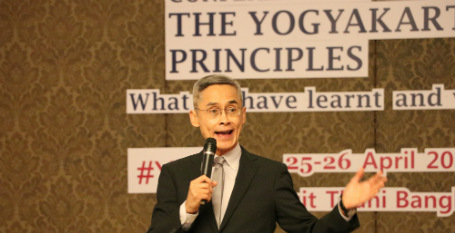Over 100 experts from LGBT civil society organizations, national human rights institutions, research bodies, the United Nations and development partners from over 25 countries and territories gathered for the a global Conference on the Yogyakarta Principles on the application of international human rights law in relation to sexual orientation and gender identity in Bangkok last week.
The conference, organized by the United Nations Development Programme (UNDP) and the Asia Pacific Forum of National Human Rights Institution (APF), covered what had been learnt and what is next for the landmark mark LGBT principles.
“The Yogyakarta Principles concisely articulate international human rights law protecting all persons irrespective of their sexual orientation and gender identity,” said Professor Emeritus Vitit Muntarbhorn, the United Nations Independent Expert charged with investigating violence and discrimination based on sexual orientation and gender identity. “They are strategic in specifying the needed actions, such as decriminalization of consensual same-sex relations.”
The Principles have helped guide the movement for greater inclusion of LGBTI people. Historic gains have been made in Asia and the Pacific, and across many parts of the world.
“Looking back 10 years ago, we could not have imagined that we would undertake the breadth and consistency of work in relation to LGBTI rights,” said Pip Dargan, Deputy Director and Gender Focal Point, APF.
“We now have history to guide us on just how much can be achieved in promoting and protecting the human rights of LGBTI people in the next 10 years.”
Released in March 2007, the Yogyakarta Principles were developed and unanimously adopted by a distinguished group of human rights experts, from diverse regions and backgrounds, including judges, academics, a former UN High Commissioner for Human Rights, UN Special Procedures, members of treaty bodies, NGOs and others.
The Principles provide clear guidance on how human rights law applies to sexual orientation and gender identity and represent an invaluable tool for activists, allies, government agencies, development agencies and human rights organizations working on sexual orientation and gender identity issues.
Over the past decade, some 25 countries and territories in the Asia Pacific region, have introduced a range of protective laws and ordinances, passed supportive court judgements, and pioneered constitutional reform processes that promote the equality of LGBTI people.
However, there have also been significant hurdles and setbacks along the way. LGBTI people are still subject to widespread stigma, discrimination and violence in education, employment, health care settings, in their communities and even within their families. And far too often LGBTI people are excluded from development opportunities.
Furthermore, there remains a great degree of misunderstanding and lack of awareness regarding intersex variations by policy makers, the public and human rights advocates. Few countries in Asia and the Pacific, or indeed the world, have attempted to develop laws and policies to recognize and protect the rights of intersex people.












 打印版本
打印版本




















读者回应
抢先发表第一个回应吧!
请先登入再使用此功能。